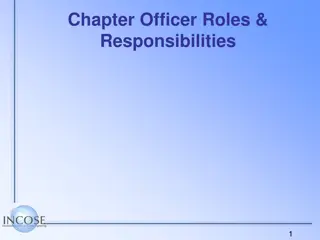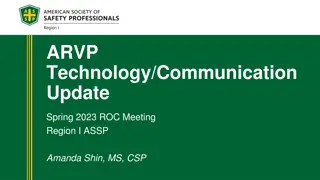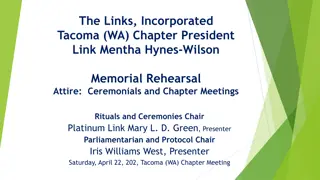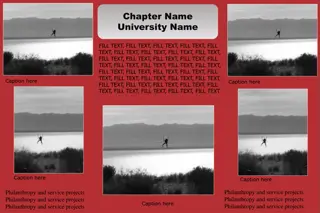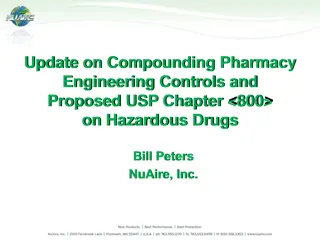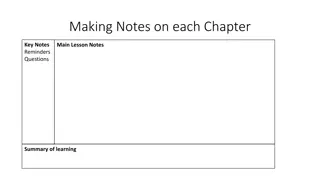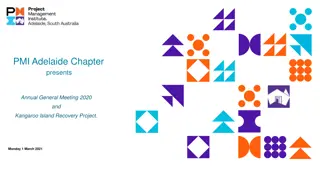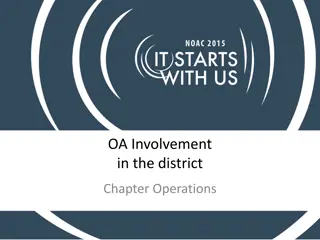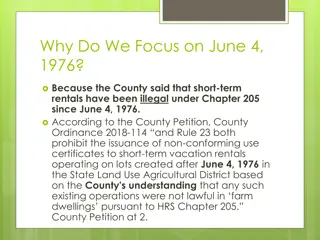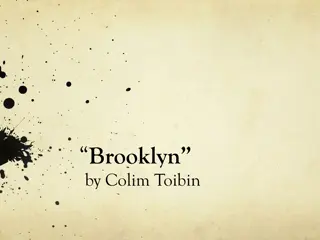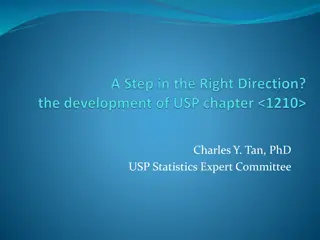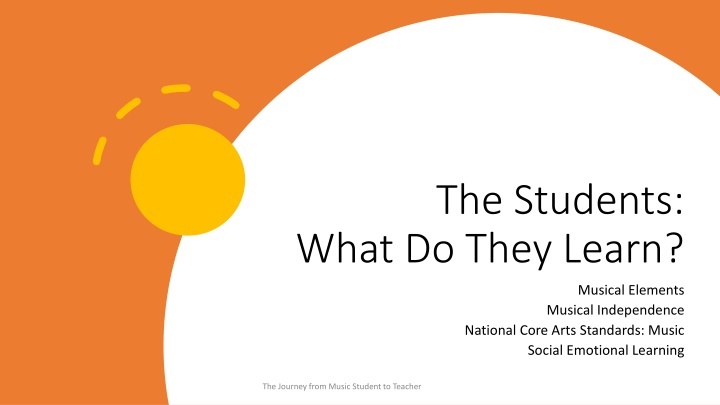
Musical Elements, Independence, and Teaching Journey
Explore the importance of musical elements like tonal, temporal, structural, and expressive in music learning, foster musical independence among students, and understand the transition from music student to teacher. Discover the National Core Arts Standards for Music and how they guide music education decisions.
Download Presentation

Please find below an Image/Link to download the presentation.
The content on the website is provided AS IS for your information and personal use only. It may not be sold, licensed, or shared on other websites without obtaining consent from the author. If you encounter any issues during the download, it is possible that the publisher has removed the file from their server.
You are allowed to download the files provided on this website for personal or commercial use, subject to the condition that they are used lawfully. All files are the property of their respective owners.
The content on the website is provided AS IS for your information and personal use only. It may not be sold, licensed, or shared on other websites without obtaining consent from the author.
E N D
Presentation Transcript
The Students: What Do They Learn? Musical Elements Musical Independence National Core Arts Standards: Music Social Emotional Learning The Journey from Music Student to Teacher
Do as I do LIGHTLY ROW MELODY LIGHTLY ROW BASS LINE ENSEMBLE SWITCH GAME ADD SOLFEGE DO = DO, MI OR SO, SO = SO, FA, RE, OR TI LET S HAVE FUN!
Musical Elements What musical elements were we able to attend to in the process of learning and performing Lightly Row? Tonal Temporal (rhythm) Structural Expressive How can enabling or enhancing a student s understanding in each of these elements of music help them increase their musical understanding regardless of the level at which they are studying music?
Musical Independence What is musical independence? In what ways might the opening activity foster musical independence among the learners? Why must teachers seek to foster musical independence practice selflessness and patience?
Teacher Control Student Autonomy Novice Intermediate Advanced How does this impact the development of musical independence and what you are teaching your students? What does this mean?
What are they? The National Core Arts Standards for Music How might they help you make decisions about what students should learn in your music classroom?
The 1994 Music Standards 1. Singing, alone and with others, a varied repertoire of music. 2. Performing on instruments, alone and with others, a varied repertoire of music 3. Improvising melodies, variations, and accompaniments 4. Composing and arranging music within specific guidelines 5. Reading and notating music 6. Listening to, analyzing, and describing music 7. Evaluating music and music performances. 8. Understanding relationships between music, the other arts and disciplines outside the arts 9. Understanding music in relation to history and culture. Perform Create Respond Connect The Journey from Music Student to Teacher
Organization of the 2014 National Core Arts Standards Three artistic processes Levels of Achievement Create Perform Respond Novice Intermediate Proficient Accomplished Advanced Music Learning Environments pK 8 General Music Composition/Theory Music Technology Guitar/Keyboard/Harmonizing Instruments Ensemble The Journey from Music Student to Teacher
Create Imagine What the learner should do Generate musical ideas for various purposes and contexts Plan & Make Select and develop musical ideas for defined purposes and contexts. Evaluate & Refine Evaluate and refine selected musical ideas to create musical work that meets appropriate criteria. Present Share creative musical work that conveys intent, demonstrates craftsmanship, and exhibits originality. The Journey from Music Student to Teacher
Perform Select What the learner should do Select varied musical works to present based on interest, knowledge, technical skill, and context. Analyze Analyze the structure and context of varied musical works and their implications for performance. Interpret Develop personal interpretations that consider creators intent. Rehearse, Evaluate & Refine Evaluate and refine personal and ensemble performances, individually or in collaboration with others. Present Perform expressively, with appropriate interpretation and technical accuracy, and in a manner appropriate to the audience and context. The Journey from Music Student to Teacher
Respond Select What the learner should do Choose music appropriate for specific purposes and contexts. Analyze Analyze how the structure and context of varied musical works inform the response. Interpret Support an interpretation of a musical work that reflects the creators /performers expressive intent. Evaluate Support personal evaluation of musical works and performance(s) based on analysis, interpretation, and established criteria. The Journey from Music Student to Teacher
Standards-based Curriculum Note which of the standards were not addressed and suggest how these standards might be addressed in future lessons. Look through your standards at a glance list and note which of the standards were addressed by our opening activity.
You are in your first-year teaching in a school district and your school administration has been contacted by several parents who are questioning the content their children are exposed to in your classroom because it is considerably different from that of previous years. Your administrators wants to be supportive of your professional decision-making regarding the content you have chosen to use and have asked you to help them respond to these parents, so they understand your instructional intent. What would be your response to their request? Think about your response and write down some talking points that will help you communicate your ideas effectively. Scenario Activity
SEL Learning Competencies Self-awareness Self-management Social Awareness Relationship Skills Responsible Decision Making
Self-awareness The ability to consider and understand your own emotions, thoughts, values, and experiences, and how these can influence your actions.
Self- management focuses on an individual's ability to regulate and control their emotions, thoughts and behaviors.
Social Awareness Your ability to empathize with others, and to consider the perspective of those in different situations than you, your awareness of other diverse individuals and groups, and your ability to make sure you are treating others fairly.
Relationship Skills The ability to make positive connections with others, as well as your ability to take their emotions into account in different situations and social interactions, in order to establish and maintain healthy, mutually rewarding relationships.
The ability required to make positive and constructive choices based on individual and social factors like personal and academic goals, ethical standards, safety concerns and social norms. Responsible Decision-making
Staying on Track

